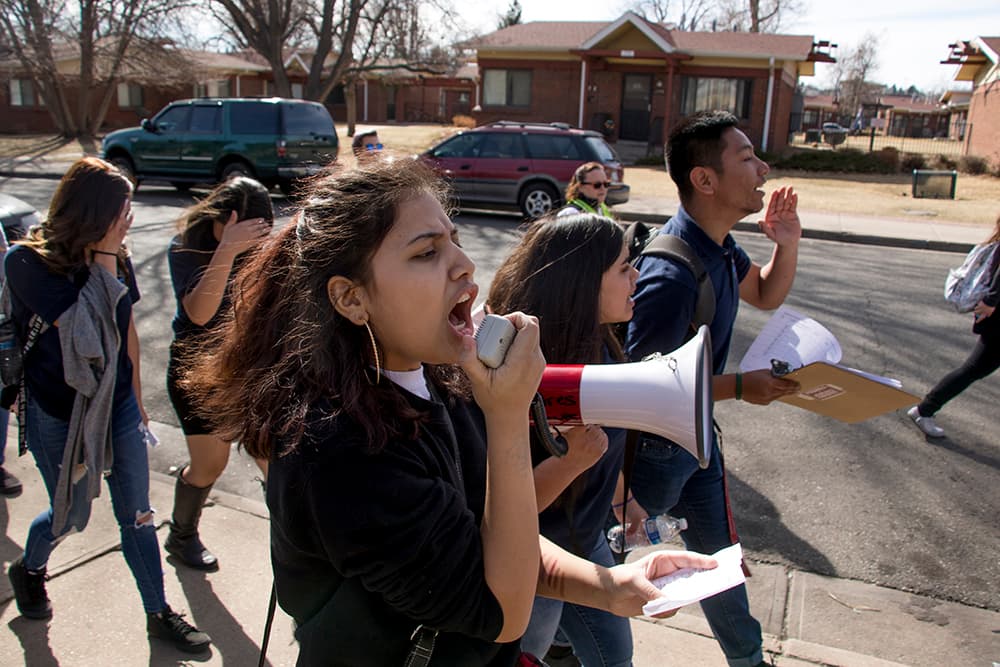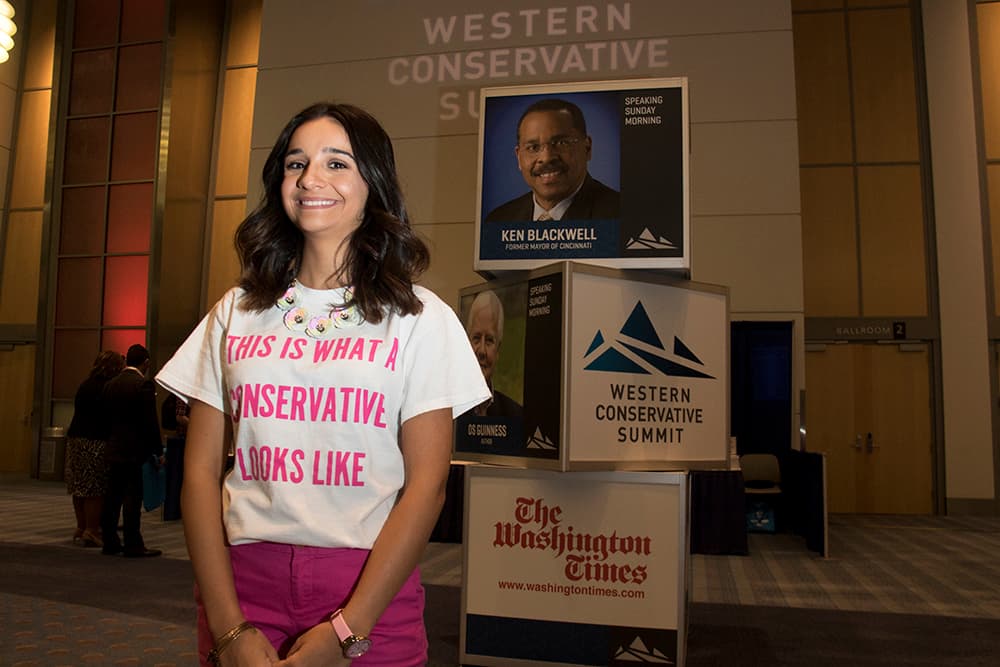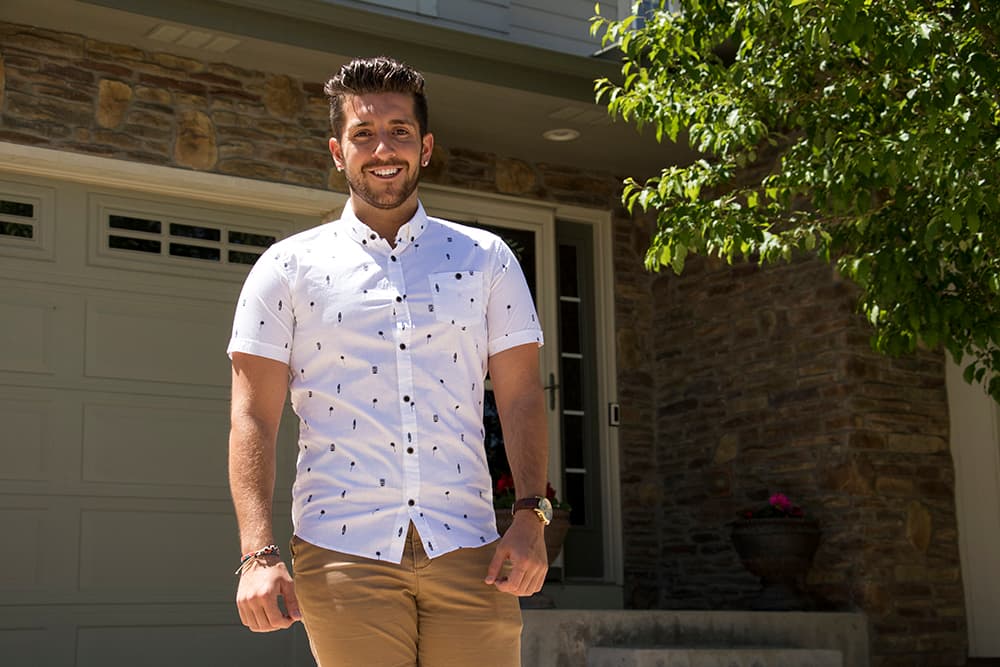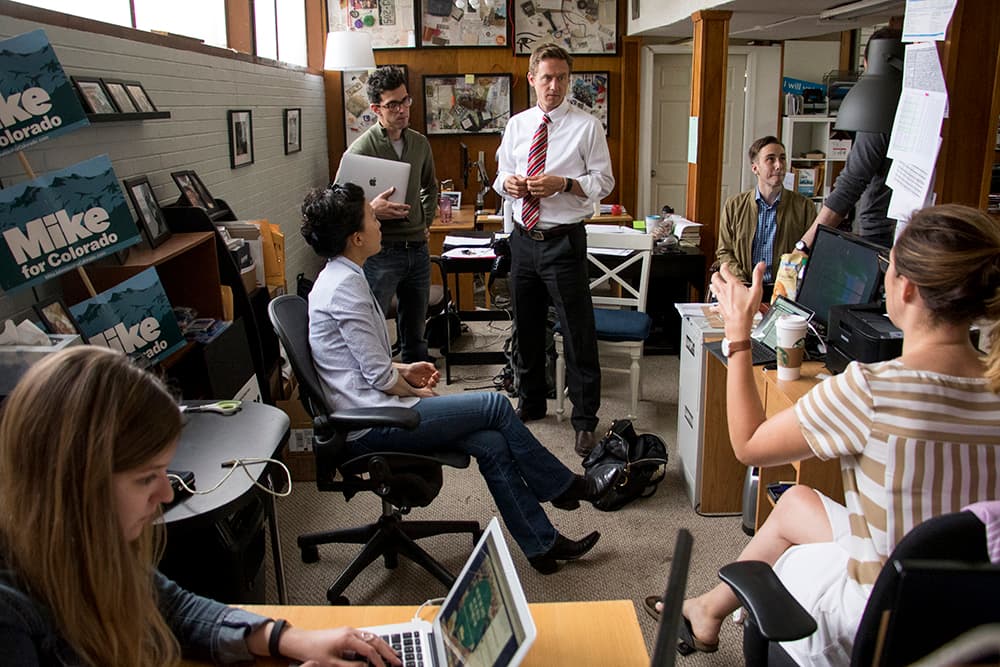
If you want a picture of what high voter turnout looks like, look no further than Colorado. The state has been on an impressive streak: For elections held between 2008 and 2016, one report last year showed Colorado consistently cracked the top five states for voter turnouts.
Only once in that time, in 2010, did the state fail to crack the top 5, finishing an abysmal — no, wait, the state still finished in in the top ten, coming in ninth. The report credited the consistently high turnout to the state’s voting laws, which allow for same-day registration and getting ballots in the mail, as well as Colorado’s status as a battleground state.
This year’s election could see similar turnout for midterm elections, which in Colorado and 35 other states includes electing a governor. And one group that could be pivotal in helping sway the results is — surprise — young voters.
Lizzy Stephan, Executive Director at New Era Colorado, said voters in the 18 to 35 age group this year make up 1 in 3 eligible voters in Colorado. That’s a lot of voters, translating to more than 1.2 million of the 3.8 million-plus eligible voters in the state.
“They have the potential to make a pretty incredible impact,” Stephan said.
People between the ages of 18 and 40 make up 40.5 percent of registered voters in the state (1,551,703). A majority of these voters (46.8 percent) are unaffiliated, followed by registered Democrats (28.6 percent) and Republicans (21.5 percent). These numbers are reflective of overall voter trends: Around 38 percent of voters in Colorado are unaffiliated, while both Democrats and Republican registered voters sit at about 30 percent each.
Registered voters in the 18 to 25 year old range comprise just 12 percent (445,333) of all registered voters in Colorado. Nearly 50 percent of registered voters in this age range are registered as unaffiliated, while 26 percent are registered Democrats and 21 percent are registered Republicans.
New Era Colorado, a left-leaning group focused on engaging young voters, was the primary advocate behind the 2013 bill that gave 16- and 17-year-olds the ability to pre-register in Colorado.
The nonpartisan group registered 55,000 young people for the 2016 election cycle and are hoping to register 40,000 for this year’s election. They register voters on college campus, community events, breweries, concerts — wherever the youth frolic (yes, they said they will try to be at Grandoozy).

The potential for young voters in Colorado to sway this fall’s election earned the state a third-place spot among states whose young voters could impact the outcome of governor’s races. That study, “Where will young voters impact the 2018 elections?” was published last month by Tufts University’s Center for Information and Research on Civic Learning and Engagement.
“We’ve seen increasing levels of young voter turnout in Colorado over each of the last major elections pretty much ... from 2010 to 2014, we saw a big jump from young voter turnout,” Stephan said.
The CIRCLE study included nine factors to weigh each state’s potential, with Colorado scoring high for its percentage of young people in the state population (17 percent) and voting laws that make it easier to register. The study reported Colorado's youth had an above average voter turnout (31 percent) in 2014. (CIRCLE’s rankings are similar to lists showing the most competitive gubernatorial races in the country.)
Stephan said the state’s voting laws make it easier for young people to be engaged in its process.
“We’re usually in the top two or three states with the highest young voter turnout, so we weren’t surprised for that reason and we weren’t surprised because we’ve seen young people play such an important role in politics here," Stephan said.
Colorado was also ranked fifth among states with House races, with young voters capable of impacting the contest 6th Congressional District race (arguably Colorado’s only competitive congressional race).
“Our generation is paying attention,” New Era Colorado Advocacy Director Charley Olena said. “They’re engaged and eager to participate in our democracy and really help shape our democracy and what it will look like going forward."
Young voters seem to eager to participate, though some are still making up their mind.
Sam Stookesberry, a 30-year-old communication manager at a charter school network, was a Republican delegate during the party’s convention in April. He lives in Denver and is planning on voting in the primary but said he’s not really sure who he will be supporting for governor.
Adding to his hesitation is how GOP candidates are currently speaking.
“My politics tend to be pretty middle of the road and I guess for that reason, (it) really bums me out that it doesn’t sound like they’re speaking to me,” Stookesberry said. “It sounds like they’re talking to extremes in the party.”
Stookesberry said he’s been a split-ticket voter in the past. He doesn’t agree with Democratic ideas for universal health care options, but he doesn’t agree with Republican hardlining on immigration. He wants the next governor to focus on transportation, ensuring roads are being built, public transit, protecting the outdoors and an education system that offers parents a choice.
So who will get his vote?
“Somebody who gets Colorado and who can get as independent (as possible),” Stookesberry said, adding that he’s not happy with the nationalization of state politics. He said Gov. John Hickenlooper “hasn’t been perfect” but he did a good job of being independent and representing Colorado without getting too tied up with national fights.
“I don’t want a party warrior, a real firebrand,” Stookesberry said.
Shahid Ahmed is a recent CU-Denver graduate. Ahmed, 22, is an unaffiliated voter who also hasn’t made up his mind yet about who has earned his vote.
“As of right now, I actually don’t know exactly. I am planning on doing a lot more research, just determine (a choice) based on the issues that they care for most,” Ahmed said.

Ahmed is excited to participate in the primary, which is a new option for unaffiliated voters.
Like Stookesberry, Ahmed also has a list of issues he would like the next governor to address: A focus on climate change, immigration reform, the student debt crisis, affordable housing and LBGTQ rights, as well as, “a wide array of social justice” issues including reproductive rights.
The candidate who has the best solutions for how they will address the issues Ahmed cares about most will earn his vote.
“To me, that’s the most important thing politicians can do,” Ahmed said.
Leah Marvin-Riley, 28, is President of Denver Young Democrats. A project manager in Denver, she plans on voting for Cary Kennedy during this month’s primary. She adds that her views don't necessarily reflect the opinions of Denver Young Democrats.
“I like Cary Kennedy for many reasons, number one, she’s extremely qualified,” Marvin-Riley said. “She’s already been in statewide office and I really resonate with the issues that she talks about.”
Public education is the issue Marvin-Riley said she’s most interesting in seeing the next governor address, which is why she said she’s thrown her support behind Kennedy.
“It’s become an issue that I care about more because it’s so relevant and important and complicated in the state,” Marvin-Riley said.
She said she recently found herself talking about current politics among her friends, but it doesn’t necessarily mean all young people are participating.
“We think everybody is engaged and when you step outside any bubble, you realize that a lot of people know less about these races than you thought,” Marvin-Riley said.
But she said she’s still finding most people are becoming more and more aware of the political climate as they come of age and they think about how policy affects their lives. She said she believes the Democratic Party can do a better job of voter outreach that could promote more participation, though she also acknowledge the party is active working to increase these efforts.
One of the reasons she ran to be president was to, “increase access to politics in space that (had) people who weren’t involved before.”
Gubernatorial candidates are trying to capitalize on young voters’ interest in the race.
Republican candidate Victor Mitchell has a platform that includes allowing new graduates to work in state government for debt forgiveness and reducing college housing costs while placing a freeze on tuition increases. He wants to reduce apprenticeship requirements to give quicker access into certain trade occupations.
“Victor has made engagement with young voters a major priority over the past year with dozens of events at colleges, universities, and trade schools around the state,” campaign manager Ian Lindemann said.
Republican candidate Greg Lopez is “anxious” to engage with people of all ages, his campaign spokesperson Jack Meyer said in email. Lopez’s campaign recently launched a Facebook page, “Colorado youth for Greg Lopez” and has reached out to college conservative groups.
“However, it is not just young conservatives that Greg is trying to reach,” Meyer said in the release. “He wants to connect with all young people to understand what is on their minds.”
Lt. Gov. Donna Lynne, a Democrat, is taking a similar approach, with her campaign spokesperson Michele Ames saying they’re trying to engage younger voters through events, volunteering and social media. They’re encouraging traditional ways to interact as well, including attending debates and forums. (Also, did you hear about her tattoo?)
Mara Sheldon, campaign spokesperson for U.S. Rep. Jared Polis, called Polis a “digital native,” which she said helps him connect directly with young voters. It might help that he tweets all the time from his two accounts, evening weighing in on the latest what-did-you-see/hear meme splitting the internet apart (he heard “laurel,” btw).
“Jared is happiest connecting with younger voters over Facebook, Twitter, and Reddit,” Sheldon said in an email. “His vision for our state includes ideas that young Americans across our country are rallying behind — a renewable-energy future, an open and free internet, a thriving cannabis industry, and the fundamental belief that healthcare is a human right.”
Metropolitan State University assistant professor of communication Samuel M. Jay said candidates joining social media is an obvious attempt to attract a young audience. But its value for candidates isn’t necessarily related to using it to connect to people, but rather its potential to collect information on them.
“I don’t think it’s still used for communication as much as it is for data collection,” Jay said, adding later, “We’re the product. Our data is the product. We are the things that companies buy to more effectively target to advertisers, or in this case, to voters."
He calls social media less of an engagement tool for candidates and more of a content circulation one. So in other words, Jay said he doesn’t see the number of Twitter followers or Facebook likes as a good metric for popularity. He used President Trump’s tweeting as an example.
“I would make the argument that Trump’s use of Twitter is not as influential as the media coverage of Trump’s tweet,” Jay said. “If he tweeted and nobody cover it, it wouldn’t have the impact that it does.”
At least one candidate has deployed their children to help with youth outreach. Former state treasurer Cary Kennedy’s son, Kadin, 20, is working with other young people in Colorado Springs with door-knocking, phone banking and recruiting volunteers, Kennedy’s spokesperson Serena Woods said via email.
“A number of 18-year-olds caucused for Cary and went on to represent her as State Assembly Delegates,” Woods said in an email. “They are all so excited to be able to use their voice this year and we are seeing the power of their voices across the country. Millennials also include a lot of young moms and families.”
With the primary nearing, Democrat Mike Johnston said his campaign is targeting voters who traditionally aren’t as inspired by politics, including young people and communities of color.

Last month, his campaign office in Denver was swarming with young people manning desks and making calls. He credits his former career as a teacher and school principal. Some former students are part of his staff.
“I think that people have not, historically, reached out to young voters in a real way and we’ve spent a lot of time and effort doing that,” Johnston said. “I think that this is a moment where that community is going to be very active and very engaged.”
“I’ve always believed that if you can activate and mobilize young people, they are the most powerful catalyst for change,” Johnston said.
But Stephan said young voters tend to be motivated by issues and not candidates.
Young voters typically aren't single-issue voters. New Era found that out pretty quickly when they surveys young people in the field: They found these voters didn’t want to be restricted to naming a top three. Stephan said they were more eager to discuss the “15 or so” issues they were most concerned with this year.
These issues included, but weren’t limited to, social justice reform, addressing gun violence, developing immigration reform, racial justice, economic reform and addressing climate change. They’ve also expressed anger over corporate money in politics and are interested in political finance reform.
"Issues have to be front and center," Stephan said. "Whether you're running a candidate campaign or doing young voter mobilization work like we are, we find that, what they care most about is who is going to advance progress on the issues impacting their lives, whether that’s students debt reform, police brutality, wages, anything along those lines."












